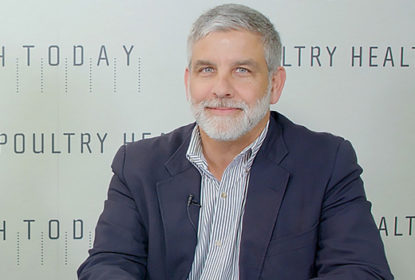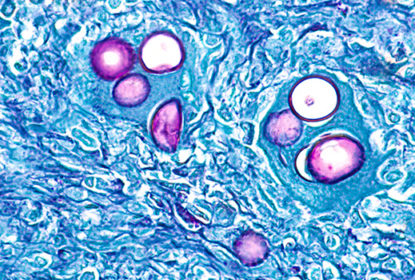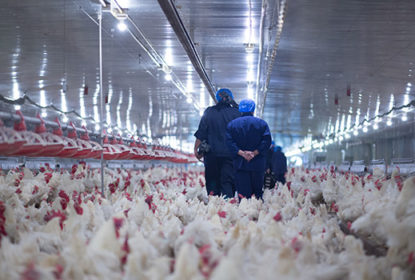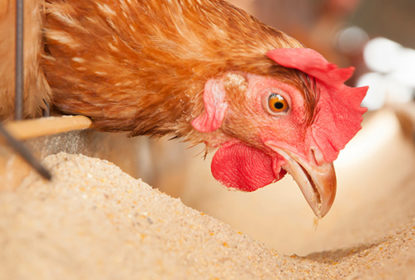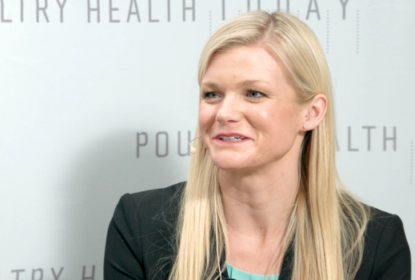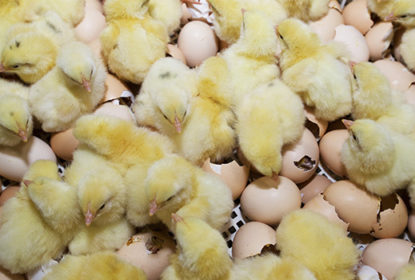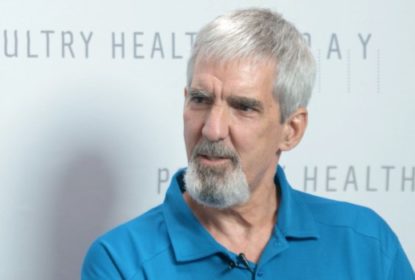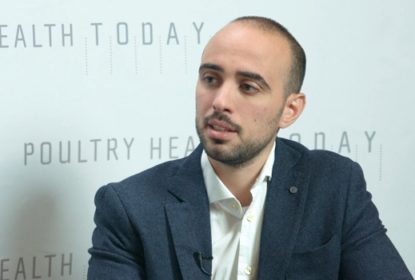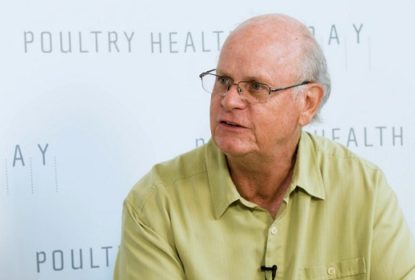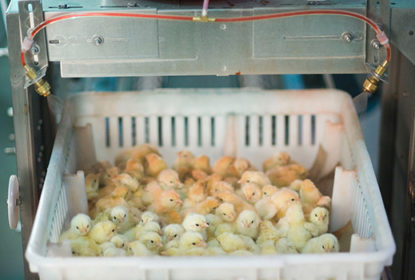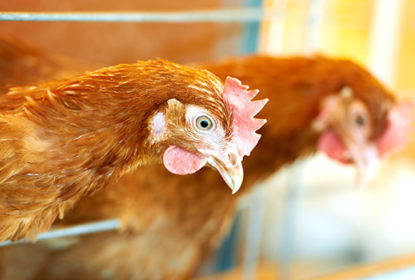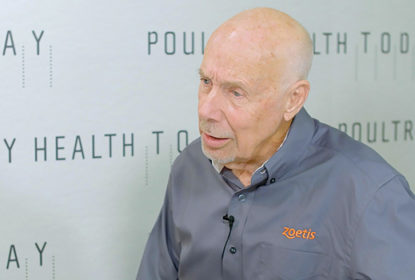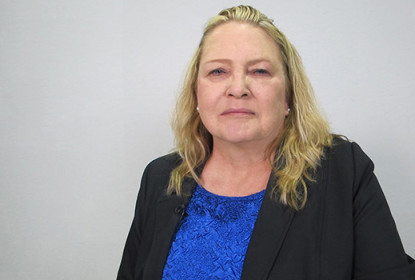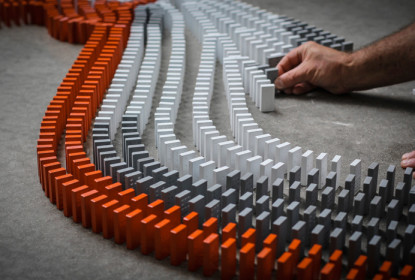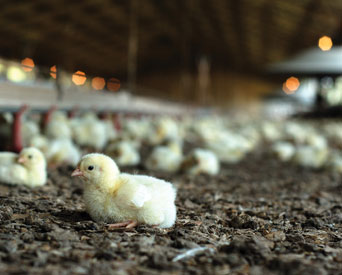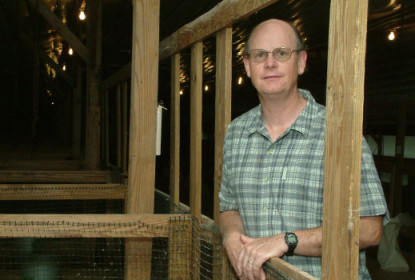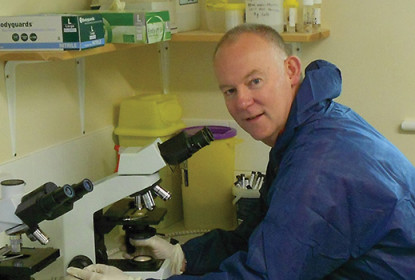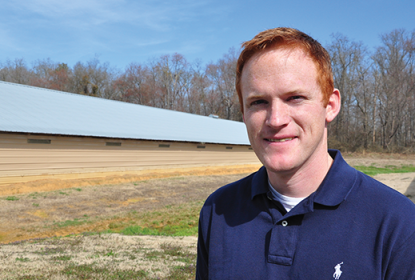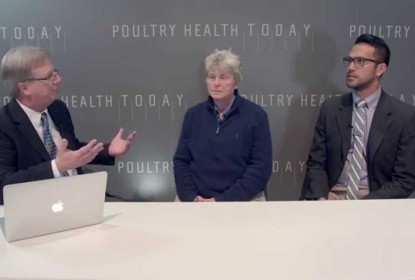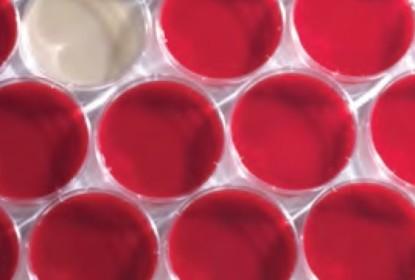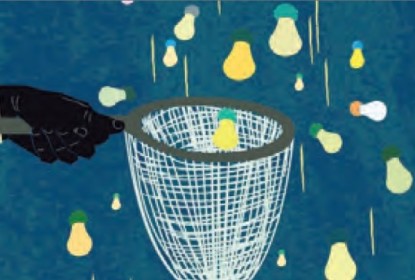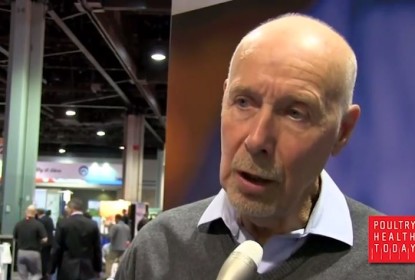Tag Archive: coccidiosis
... Coccidiosis: An old problem with some new challenges
Dec 01, 2022Jennifer GrullonComments Off on Coccidiosis: An old problem with some new challenges
Coccidiosis in broiler houses remains a nagging challenge. While clinical manifestations are rare, it’s the subclinical condition that impacts the flock through poor feed efficiency and reduced...... Anticoccidial sensitivity tests: Useful or not?
Oct 06, 2022Jennifer GrullonComments Off on Anticoccidial sensitivity tests: Useful or not?
By Philip A. Stayer, DVM, MS, ACPV, Corporate Veterinarian, Sanderson Farms, Inc.... Greater understanding needed before new coccidiosis vaccines come to fore
Aug 03, 2022Jennifer GrullonComments Off on Greater understanding needed before new coccidiosis vaccines come to fore
The use of recombinant vaccines can prove a valuable strategy against coccidiosis in poultry, but better understanding of host-parasite interactions and gut microbiology is needed.... Special Report: New insights for managing coccidiosis in broilers
Jun 01, 2022Jennifer GrullonComments Off on Special Report: New insights for managing coccidiosis in broilers
Despite industry advances, coccidiosis remains the leading intestinal health disease of broilers. Poultry Health Today asked experts to share latest insights and recommendations for managing this...... Bioshuttle programs valuable tool for managing coccidiosis
Mar 24, 2022Jennifer GrullonComments Off on Bioshuttle programs valuable tool for managing coccidiosis
Bioshuttle programs are a valuable tool for managing coccidiosis, according to Greg Mathis, PhD, Southern Poultry Research.... Cutting ionophore use could do more harm than good, veterinarians warn
Feb 03, 2022Jennifer GrullonComments Off on Cutting ionophore use could do more harm than good, veterinarians warn
SOUND SCIENCE: Removal or reduction of ionophores for the control of coccidiosis in poultry could lead to increased antibiotic use, higher production costs and negative impacts on climate-change...... Ionophore status change would threaten bird health, sustainability, veterinarian warns
Dec 02, 2021Jennifer GrullonComments Off on Ionophore status change would threaten bird health, sustainability, veterinarian warns
There is no need to recategorize ionophores, used as feed additives against coccidiosis, as veterinary medicines, says UK poultry veterinarian Daniel Parker — and doing so could have severe...
Food Safety, Global TOP NEWS, Gut Health, Interviews, News, PHT GLOBAL, PHT US, Podcast, Sustainability, TOP NEWS, Videos
... Right skills critical to managing increases in Salmonella, coccidiosis associated with cage-free egg production
Jun 23, 2021Jennifer GrullonComments Off on Right skills critical to managing increases in Salmonella, coccidiosis associated with cage-free egg production
Producers making the switch to cage-free egg production need to ensure they are properly prepared for managing potential increases in Salmonella and other health challenges.... Good management and biosecurity vital to overcoming disease challenges in NAE systems
Jun 02, 2021Jennifer GrullonComments Off on Good management and biosecurity vital to overcoming disease challenges in NAE systems
Getting back to basics with bird and house management is key to overcoming coccidiosis and other health issues affecting producers using NAE systems.... Coccidiosis in conventional flocks presenting a significant challenge
Dec 07, 2020Jennifer GrullonComments Off on Coccidiosis in conventional flocks presenting a significant challenge
A shift in microbiology could be responsible for a surge in coccidiosis problems being seen in conventional US broiler and pullets flocks, according to Pilgrim's DVM Suzanne Dougherty.... ‘Causal’ pie chart can help manage necrotic enteritis
Dec 29, 2019Jennifer GrullonComments Off on ‘Causal’ pie chart can help manage necrotic enteritis
Use of a simple “causal” pie chart is proving to be a helpful tool for controlling necrotic enteritis (NE).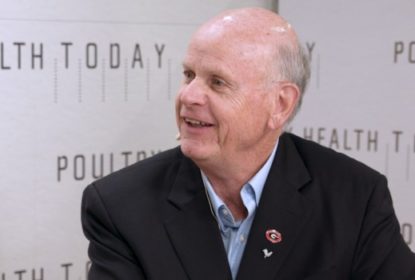
Antibiotic-free, Flock welfare, Global TOPICS, Interviews, News, PHT GLOBAL, PHT US, Podcast, TOPICS, Videos
... Coccidiosis control: Keys to success with a bioshuttle program
Oct 20, 2019Jennifer GrullonComments Off on Coccidiosis control: Keys to success with a bioshuttle program
Resistance is unlikely to be a problem in coccidiosis bioshuttle programs, Greg Mathis, PhD, Southern Poultry Research, told Poultry Health Today.... Coccidiosis vaccination impedes nutrient digestibility
Aug 30, 2019Jennifer GrullonComments Off on Coccidiosis vaccination impedes nutrient digestibility
Poultry veterinarians and production managers are all too familiar with coccidiosis and its impact on gut health, nutrient absorption, feed conversion and growth rate.... World poultry industry still struggling with necrotic enteritis
Jun 27, 2019Jennifer GrullonComments Off on World poultry industry still struggling with necrotic enteritis
NE remains a formidable challenge in broilers raised without antibiotics, and preventing the disease means steering clear of predisposing factors and implementing a rigid coccidiosis-control plan.... Bioshuttle program helps control E. tenella outbreaks in pullets
May 02, 2019Jennifer GrullonComments Off on Bioshuttle program helps control E. tenella outbreaks in pullets
Administration of an in-feed anticoccidial after coccidiosis vaccination has helped alleviate outbreaks of Eimeria tenella in broiler breeder replacement stock.... Life without antibiotics: Field lessons learned the hard way
Apr 15, 2019Jennifer GrullonComments Off on Life without antibiotics: Field lessons learned the hard way
Producers need to think long and hard before jumping into “no antibiotics ever” (NAE) poultry production.... Early exposure to Clostridium protects birds from necrotic enteritis
Feb 21, 2019Jennifer GrullonComments Off on Early exposure to Clostridium protects birds from necrotic enteritis
Early exposure to Clostridium perfringens in used litter may be a way to minimize the impact of necrotic enteritis (NE) in broilers, Steve Davis, DVM, told Poultry Health Today.... Necrotic enteritis control helps reduce Salmonella colonization
Feb 07, 2019Jennifer GrullonComments Off on Necrotic enteritis control helps reduce Salmonella colonization
Maintaining good intestinal health in broilers is essential for minimizing the presence of Salmonella in birds sent for processing, Manuel Da Costa, DVM, PhD, associate director for Outcomes Research...... Sanitation key to successful NAE production
Feb 04, 2019Jennifer GrullonComments Off on Sanitation key to successful NAE production
The key to successful “no antibiotics ever” (NAE) broiler production is cleanliness throughout every step of production, including a pristine hatchery.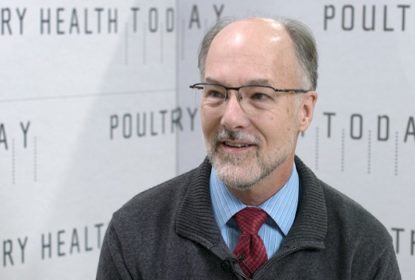
Antibiotic-free, Global TOP NEWS, Gut Health, Interviews, News, PHT GLOBAL, PHT US, Podcast, TOP NEWS, Videos
... Coccidiosis control, litter management key to NE prevention in broilers raised without antibiotics
Jan 10, 2019Jennifer GrullonComments Off on Coccidiosis control, litter management key to NE prevention in broilers raised without antibiotics
Good coccidiosis control and litter management are the two most important steps producers can take to prevent necrotic enteritis (NE) in flocks raised without antibiotics.... Fresh approach to coccidiosis needed to tackle increase in broiler gut damage
Nov 28, 2018Jennifer GrullonComments Off on Fresh approach to coccidiosis needed to tackle increase in broiler gut damage
Changes in the behavior of one of the most important coccidial pathogens means poultry producers should take a fresh look at how they deal with the parasite.... Heat stress may impair immune system in broilers
Nov 08, 2018Jennifer GrullonComments Off on Heat stress may impair immune system in broilers
Heat stress in broilers induced lesions of lymphoid tissues, indicating immune system impairment, but it’s not yet known if heat stress affects the vulnerability or severity of coccidiosis.... Coccidiosis control: New strategies for a new era
Aug 17, 2018Jennifer GrullonComments Off on Coccidiosis control: New strategies for a new era
Coccidiosis can be controlled in broilers without antibiotics as long as producers pay closer attention to hatchery coccidiosis vaccination procedures, brooding and stocking rates, Greg Mathis, PhD,...... Research focusing on new controls for coccidiosis, relationship with Salmonella
Aug 02, 2018Jennifer GrullonComments Off on Research focusing on new controls for coccidiosis, relationship with Salmonella
Alternative products for coccidiosis control remain the focus of research, but so far, the results are inconsistent, Sam Hendrix, DVM, veterinarian and researcher at Colorado Quality Research, told...... Vaccination followed with feed medication gives pullets added protection against coccidiosis
Jul 02, 2018Jennifer GrullonComments Off on Vaccination followed with feed medication gives pullets added protection against coccidiosis
Inadequate coccidiosis protection in pullets can lead to health issues ranging from uneven weight gain to mortality.... ‘Turkeys are suffering’ without good control of coccidiosis
May 04, 2018Jennifer GrullonComments Off on ‘Turkeys are suffering’ without good control of coccidiosis
Turkeys are suffering from coccidiosis due to a lack of available medications, according to Greg Mathis, PhD, Southern Poultry Research, Athens, Georgia.... Planning anticoccidial rotation strategies: Consider the consequences
Jan 25, 2018Jennifer GrullonComments Off on Planning anticoccidial rotation strategies: Consider the consequences
Anticoccidial rotation strategies help reduce the health and economic impact of coccidiosis, while preserving the efficacy of the limited range of tools available for managing it.... Closing in on coccidiosis: How metagenomics can help
Jan 19, 2018Jennifer GrullonComments Off on Closing in on coccidiosis: How metagenomics can help
Identifying coccidial species by metagenomics can help producers fine-tune their coccidiosis-control programs, said Ryan Snyder, a graduate student in the pathobiology department at the University of...... E. maxima linked to mortality in broilers vaccinated for coccidiosis
Oct 17, 2017Jennifer GrullonComments Off on E. maxima linked to mortality in broilers vaccinated for coccidiosis
Eimeria maxima in broilers vaccinated against coccidiosis appears to be an important cause of mortality, according to the preliminary results of a study presented at the 2017 annual meeting of the...... Coccidiosis, necrotic enteritis challenge cage-free layer systems
Aug 30, 2017Jennifer GrullonComments Off on Coccidiosis, necrotic enteritis challenge cage-free layer systems
Cage-free housing for egg layers allows birds to exhibit more natural behaviors, but it also carries an increased risk for morbidity and mortality...... Managing coccidia ‘leakage’ in antibiotic-free production systems
Jun 27, 2017Jennifer GrullonComments Off on Managing coccidia ‘leakage’ in antibiotic-free production systems
The US broiler industry has long relied on coccidial leakage to create immunity against coccidiosis in chickens. In antibiotic-free production systems, leakage occurs but can be more challenging to...... Are there practical alternatives to ionophores?
Nov 05, 2016Jennifer GrullonComments Off on Are there practical alternatives to ionophores?
Proponents of raising broilers without ionophores and other antibiotics have proposed putting more emphasis on farm management, biosecurity and alternatives to anticoccidials.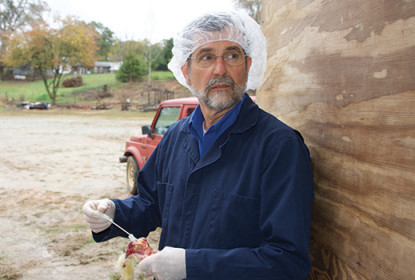
Antibiotic-free, Flock welfare, Gut Health, Infectious Diseases, ippe2016 - Highlights from our latest issue, News, PHT GLOBAL, PHT US
... The Poultry Smith
Nov 02, 2016Jennifer GrullonComments Off on The Poultry Smith
In this exclusive interview with Poultry Health Today, Fieldale Farms veterinarian John Smith reflects on his career, the state of the US poultry industry and, most importantly, what it needs to do...... Anticoccidial rotation, good husbandry can improve coccidiosis control
Aug 16, 2016Jennifer GrullonComments Off on Anticoccidial rotation, good husbandry can improve coccidiosis control
Poultry producers worldwide know the importance of cutting losses from coccidiosis – the parasitic disease that is still causing significant losses in growth rate and feed efficiency.... Managing ionophores and diets for best performance
Jul 31, 2016Jennifer GrullonComments Off on Managing ionophores and diets for best performance
Carla Price, PhD, a consulting poultry nutritionist based in Mississippi, says that for best results, producers need to consider differences in ionophores when formulating poultry feeds.
Antibiotic-free, Global TOP NEWS, Gut Health, ippe2016- Interviews with experts, News, PHT GLOBAL, PHT US, TOP NEWS, Videos
... Mathis: Long-term planning key to effective coccidiosis management
Jul 07, 2016Jennifer GrullonComments Off on Mathis: Long-term planning key to effective coccidiosis management
Whether the production system is antibiotic-free or conventional, long-term planning and strategic rotation programs are the best ways to ensure effective, sustainable control of coccidiosis, the...... Coccidiosis, intestinal health and their relationship to pathogen loads of harvested broilers
Jun 30, 2016Jennifer GrullonComments Off on Coccidiosis, intestinal health and their relationship to pathogen loads of harvested broilers
For more than 60 years, antibiotics and synthetic anticoccidials have teamed up to keep coccidiosis under control and produce least-cost meat, said Donald Waldrip, DVM, senior technical services...... Tyson vet shares experiences with antibiotic-free broilers
Jun 02, 2016Jennifer GrullonComments Off on Tyson vet shares experiences with antibiotic-free broilers
Producing Salmonella-free chicks without antibiotics is a delicate procedure — sort of a little like baking a cake, says Scott Gustin, DVM, director of veterinary services for Tyson.... Five opportunities to optimize gut health, minimize necrotic enteritis in broilers
May 16, 2016Jennifer GrullonComments Off on Five opportunities to optimize gut health, minimize necrotic enteritis in broilers
By Suzanne Dougherty, DVM, MAM, MS, DACPV Pecking Around Consulting, Inc. Madison, Ala.
Announcements, Antibiotic-free, Flock welfare, Food Safety, Gut Health, Infectious Diseases, ippe2016 - Highlights from our latest issue, Mobile Only, News, PHT GLOBAL, PHT US
... Specialists explore new options for managing flock health while defending judicious antibiotic use
Mar 27, 2016Jennifer GrullonComments Off on Specialists explore new options for managing flock health while defending judicious antibiotic use
Growing demand for poultry raised without food-animal antibiotics has put more pressure on veterinarians to find alternative yet dependable disease-control options, according to a panel of nine...... Antibiotic-free production: Tips for making it work
Feb 10, 2016Jennifer GrullonComments Off on Antibiotic-free production: Tips for making it work
After following trends in antibiotic-free production over the past several years, Tim Cummings, DVM, has identified a few production practices worth incorporating.... Free 2015 AAAP Proceedings Booklet
Jan 21, 2016Jennifer GrullonComments Off on Free 2015 AAAP Proceedings Booklet
Pressures to reduce or eliminate antibiotics from poultry production have created new health and welfare challenges for chickens and turkeys. In this lively roundtable discussion, poultry industry...... Three more broiler diseases you can manage with vaccination
Nov 11, 2015Jennifer GrullonComments Off on Three more broiler diseases you can manage with vaccination
There's more to poultry health than Marek's, IBD, ILT and ND. Vaccines also play major roles in curbing these common diseases.... New coccidiosis-management initiative aims to reduce losses
Oct 14, 2015Jennifer GrullonComments Off on New coccidiosis-management initiative aims to reduce losses
Targeting the global poultry industry’s more than $3 billion in annual losses to coccidiosis, Zoetis Inc. introduced a new, science-based initiative to help poultry producers worldwide develop...... Fine-tuning rotation plan can improve coccidiosis management
Sep 29, 2015Jennifer GrullonComments Off on Fine-tuning rotation plan can improve coccidiosis management
Broiler producers have made important strides in managing coccidiosis but could further improve control and cut losses by rethinking their strategy for anticoccidial rotation, say veterinarians who...... Ionophores look different to other scientists, too
Sep 28, 2015Jennifer GrullonComments Off on Ionophores look different to other scientists, too
Several organizations have drawn the line distinguishing ionophores from other types of antibiotics.... Are ionophores antibiotics? That depends on whom you ask
Sep 28, 2015Jennifer GrullonComments Off on Are ionophores antibiotics? That depends on whom you ask
In the EU — a market often perceived to be less tolerant of antibiotic use in food animals than the US — antibiotics used for growth promotion were banned in 2006. However, certain ionophores,...... ‘Rotate smarter,’ says coccidiosis specialist
Sep 19, 2015Jennifer GrullonComments Off on ‘Rotate smarter,’ says coccidiosis specialist
Poultry producers need to “rotate smarter” and learn the differences between anticoccidials if they want to maintain effective and sustainable coccidiosis-management programs, says well-known...... Got maxima? New sampling procedure aids detection in broilers
Aug 04, 2015Jennifer GrullonComments Off on Got maxima? New sampling procedure aids detection in broilers
A modified sampling procedure developed by researchers at Zoetis Inc. has dramatically improved the detection of Eimeria maxima infection in broilers.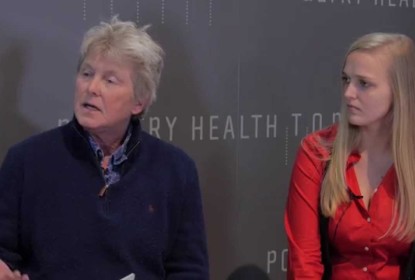
Diagnostics, Global TOP NEWS, Gut Health, ippe2015- Interviews with experts, News, PHT GLOBAL, PHT US, TOP NEWS, Videos
... Coccidiosis research yielding new perspectives on AST
Jul 30, 2015Jennifer GrullonComments Off on Coccidiosis research yielding new perspectives on AST
Adding molecular biology (PCR) to anticoccidial sensitivity testing (AST), offers a more in-depth look — and surprising findings — of Eimeria species contributing to coccidiosis in poultry...... Shrewd moves: Like a chess match, anticoccidial rotation is a game of strategy at Wayne Farms
Apr 29, 2015Jennifer GrullonComments Off on Shrewd moves: Like a chess match, anticoccidial rotation is a game of strategy at Wayne Farms
Your next move might address an immediate need, but it also could determine what pieces are still standing later in the match.... Coccidiosis expert: Timing and combination of cocci control methods critical
Apr 18, 2015Jennifer GrullonComments Off on Coccidiosis expert: Timing and combination of cocci control methods critical
Greg Mathis, PhD, of Southern Poultry Research, Athens, Georgia, talks about the continued challenges managing coccidiosis and offers suggestions for improving management programs targeting the...... Correlating lesion scores to microscores creates statistical model for efficacy, feed conversion in poultry
Jan 30, 2015Jennifer GrullonComments Off on Correlating lesion scores to microscores creates statistical model for efficacy, feed conversion in poultry
Georgia researcher Lorraine Fuller and graduate student Miguel Barrios, at University of Georgia, build new statistical model that saves poultry producers time and money by correlating lesion scores...... Rising issues with coccidiosis and necrotic enteritis
Jan 27, 2015Jennifer GrullonComments Off on Rising issues with coccidiosis and necrotic enteritis
Suzanne Dougherty, DVM, encourages “back to basics” with gut-health management while exploring new options... Sericea lespedeza found ineffective for coccidiosis control in chickens
Jan 22, 2015Jennifer GrullonComments Off on Sericea lespedeza found ineffective for coccidiosis control in chickens
Sericea lespedeza (SL), a warm-season legume shown to help control coccidiosis in lambs, had no anticoccidial activity in chickens, according to a study conducted at the University of Arkansas.... It’s back: Zoamix® adds flexibility to rotation plans
Jan 22, 2015Jennifer GrullonComments Off on It’s back: Zoamix® adds flexibility to rotation plans
Zoetis Inc. has relaunched Zoamix® (zoalene), a versatile synthetic anticoccidial for the prevention and control of coccidiosis in broilers and turkeys.... Coccidiosis: Why is it so difficult to manage?
Jan 22, 2015Jennifer GrullonComments Off on Coccidiosis: Why is it so difficult to manage?
With more than a dozen antimicrobials and a half dozen vaccines available for coccidiosis, why are US poultry producers still having such a difficult time managing this costly disease?... Let coccidiosis organisms ‘see something different’
Nov 06, 2014Jennifer GrullonComments Off on Let coccidiosis organisms ‘see something different’
Poultry producers are losing ground to coccidiosis because they’re not implementing effective rotation programs that employ different types and classes of anticoccidials, says Don Waldrip, DVM, a...... Practical programs for achieving sustainable coccidiosis control
Oct 09, 2014Jennifer GrullonComments Off on Practical programs for achieving sustainable coccidiosis control
By H. David Chapman, PhD University Professor, Department of Poultry Science, University of Arkansas... Coccidiosis specialist: ‘Understand’ the products you’re using
Sep 11, 2014Jennifer GrullonComments Off on Coccidiosis specialist: ‘Understand’ the products you’re using
Coccidiosis has been around as long as any poultry producer can remember. And despite decades of experience with the tenacious parasitic disease, it hasn’t gotten any easier to manage. In fact,...... Coccidiosis: Why is it still so difficult to control?
Jun 12, 2014Jennifer GrullonComments Off on Coccidiosis: Why is it still so difficult to control?
Coccidiosis can be extremely difficult to manage in poultry because the organism that causes it "has a tremendous capability to reproduce and it's very resistant to any kind of attempt to destroy...... Poultry veterinarian shares ideas for managing coccidiosis more effectively, economically, sustainably
Feb 28, 2014Jennifer GrullonComments Off on Poultry veterinarian shares ideas for managing coccidiosis more effectively, economically, sustainably
Don Waldrip, DVM, talks about a new a new science-based, global initiative from Zoetis to help poultry producers develop longer term, sustainable management of coccidiosis.... Rotecc™ coccidiosis management video
Jan 24, 2014Jennifer GrullonComments Off on Rotecc™ coccidiosis management video
Learn more about the new global coccidiosis-management initiative from Zoetis.



